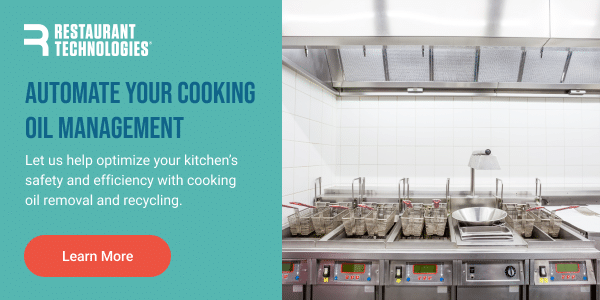Updated 2/1/2025
Have you ever accidentally left something cooking in the deep fryer until it started to burn? Then you know that burnt food causes oil to take on an unpleasant taste and smell — and the unpleasant taste will go on to attach to any food it cooks. This is happening constantly on a smaller scale in your fryer every day. As you fry food, small pieces of batter, breading or other flaky bits break off into the oil. The longer they remain, the more they will burn, and the more your oil breaks down. This is why it’s important to filter your deep fryer oil often. Of course, it’s not always clear how often you should filter. Every kitchen is different, but there are a few important factors that can help you understand how often you should filter your cooking oil:
- The type of food you’re frying: Proteins demand more frequent oil filtration than vegetables or starches. That’s why it’s a good idea to have two fryers in your restaurant kitchen if you cook both meats and veggies/starches.
- Is it breaded, battered, or crumbly? Some breading or batter will inevitably fall off during the deep frying process. The longer it remains in the oil, the more the oil will degrade.
- The size of your deep fryer/amount you cook: What’s the ratio of your fryer size to the amount of food you cook in it? If you have hectic rushes where your fryer is crowded, the oil will need to be filtered more often than if you only pop in a few batches of french fries occasionally.
With these factors in mind, combined with careful monitoring, you should be able to find an oil filtration routine that works for your kitchen.

One Easy Way to Extend the Life of Your Oil
Skimming is an extremely simple process, and all you need is a mesh skimmer from the restaurant supply store. Those bits of food that flake off into the fryer oil? Some will float to the top. They’re easy to take out with the skimmer, and the sooner they’re removed the better. Make it a habit between batches to take thirty seconds to skim as much as you can. You won’t get all of the bits, but you’ll get a lot of them. If you’re not skimming regularly, you may be shocked at how much of a difference it makes in prolonging the life of your oil.
Save on Your Insurance Premiums.
Automate your cooking oil management to improve safety, efficiency, and food quality.
How to Filter Cooking Oil
Filtering cooking oil, especially fryer oil, is crucial in restaurant kitchens to ensure both food quality and the longevity of the oil, especially when you’re following the steps to make the fryer last longer. To filter cooking oil, first turn off the fryer and allow the oil to cool slightly.
Restaurant Technologies offers an efficient restaurant oil filtration system, designed to give you insights into the filtration process and schedule, keeping your kitchen staff accountable for maintaining standard operating procedures. By tracking your filtration cycles, it makes it that much easier to maximize the life of your deep fryer oil and increase the quality of your fried foods.
For home cooks, a strainer lined with cheesecloth, coffee filters, or paper towels can be a makeshift solution for filtering oil on a small scale. However, these methods aren’t effective in high-volume kitchens where they can’t remove the fine particles or withstand the temperatures involved. Peanut oil, for example, may last longer due to its higher smoke point, but filtering regularly is still essential for maintaining freshness.By understanding how to filter deep fryer oil properly, restaurants can extend the life of their oil, save on costs, and provide consistent, high-quality fried foods.
Filter Cooking Oil at Least Twice a Day
For busy kitchens that rely on the deep fryer, we recommend filtering oil at least twice per day. This might sound like a lot, but the truth is you shouldn’t wait days between filtering — food quality suffers too much. Consistent filtration is the most important step in extending the life of your fryer oil. It also helps ensure consistent food quality and keeps operational costs down.
Follow these easy steps for proper cooking oil filtration:
- Filter for a minimum of five minutes per fryer vat
- Filter oldest oil first
- Clean fryer vat while filtering to remove any food particles
- Test oil with a kit after filtering
- Rotate fryer vats as needed
- Track filtration
- Dispose of oil with manager approval
Determine Your Oil Testing Standards
One way to determine if your oil is performing optimally is by testing it. For best results, follow a consistent procedure and perform your evaluation based on predetermined criteria. Always test after filtering.
So, how to test fryer oil quality? To determine if your oil is still good or it’s time to replace it, consider the following:
- Taste: Fryer oil should have a light intensity and pleasant aroma that doesn’t mask or overpower the food’s flavor.
- Thickness: If cooking oil is too thick or viscous, that’s a sign it has begun breaking down and should be replaced as soon as possible.
- Food texture, appearance, durability: Test-fry a piece of food to see how it responds. Food should have a crispy, tender bite. It should not appear too light or too dark, and the color should be golden. It also should not crumble or fall apart after being fried.
If any of these criteria seem off, it’s time for fresh cooking oil. When in doubt, err on the side of fresh oil because it makes such a difference in the quality of the finished product. Restaurant Technologies’ oil filtration system makes it easy to ensure kitchen staff is filtering oil on a proper cadence, extending the shelf life of your oil and improving food quality.
What Happens If You Don’t Filter Cooking Oil?
When you don’t filter regularly, your cooking oil goes bad and breaks down quickly. This means that one of two things is happening: you’re not getting as much cooking life out of your oil as you could be, or you’re cooking your food in subpar oil. Either way, it’s probably costing you more than you realize. Consider the following scenarios:
- You’re not getting as much cooking life out of your oil as you could be: In a busy commercial kitchen, certain tasks can fall by the wayside. Perhaps your employees are so focused on getting orders out that oil filtration gets forgotten — but they do remember to replace it if it takes on a dark color or burnt taste. The good news at least is that your food is getting cooked in fresh oil. The bad news is that with proper filtration your used oil likely would have stayed fresh for much longer. This inefficient oil usage drives up your food cost and cuts into your profit margin.
- Your food gets cooked in subpar oil: Subpar oil produces subpar food, which leads to customers leaving your establishment less satisfied, and less likely to turn into repeat customers.
Reminder: Different types of oil need to be filtered or replaced at different times. For example, canola oil shelf life is different from vegetable oil. It’s also important to develop a plan for how to store used cooking oil once it’s been replaced.
Which Cooking Oils Hold Up Best to Reuse?
Different oils have different smoke points and stability levels, meaning some break down faster than others. Here’s a quick guide to how approximately how long certain oils can typically last when filtered and stored properly
| Oil Type | Frying Uses (Approx.) | Notes |
| Peanut Oil | 4–6 uses | High smoke point; great for deep frying |
| Canola Oil | 3–5 uses | Neutral flavor; filter often |
| Soybean Oil | 2–4 uses | Breaks down quickly with proteins |
| Sunflower Oil | 2–3 uses | Delicate; monitor closely |
| Corn Oil | 2–4 uses | Good flavor, but oxidizes faster |
Storing Filtered Fryer Oil
Once you’ve filtered your frying oil, storing it properly can help keep it fresh longer. Here are a few best practices:
- Cool first: Never try to store hot frying oil — wait until it’s completely cooled.
- Use a clean, food-safe container: Metal, glass, or heavy-duty plastic work well.
- Keep it sealed and in the dark: Exposure to light and air speeds up degradation.
- Label and date it: Especially if you’re using multiple batches of oil.
If the oil smells off, appears cloudy, or foams during cooking, it’s time to toss it.
Should You Filter or Replace? A Quick Decision Guide
Not sure whether to filter your oil again or replace it completely? Use this quick cheat sheet:
| Scenario | Action |
| Oil is clear/light and smells neutral | Filter and reuse |
| Oil is dark but doesn’t smell burnt | Filter, then test |
| Oil smells rancid, fishy, or sour | Replace immediately |
| Fry results are uneven or greasy | Replace and reset vat |
| Oil is foaming before cooking starts | Replace and clean the fryer |
The goal is to replace only when necessary, not earlier, not later.
Want to stop guessing when it’s time to filter? Our automated oil filtration systems track everything for you — no clipboard needed. Learn more about Restaurant Technologies’ smart solution
Tips for Training Kitchen Staff on Oil Filtration
Consistency matters most when it comes to oil care. That’s why clear training is key. Here’s how to help your team filter oil effectively, every shift:
- Document your process – Step-by-step instructions with visuals help reinforce best practices.
- Set reminders – Post signage near fryers, or use digital alerts via automated systems.
- Assign responsibility – Make it part of opening, mid-shift, and closing duties.
- Train new hires early – Oil care should be part of day-one onboarding.
- Use tracking logs – Whether manual or digital, logging filtration creates accountability.
When everyone’s on the same page, it’s easier to stick to a routine that keeps your oil in top condition.
How to Filter Your Cooking Oil More Often
There’s no question that frequent filtration extends the life of your deep fryer oil, improves the quality of your food, and saves you money. The only question is: how can you filter your cooking oil more often? Especially in busy kitchens, sometimes there’s just no downtime. There are a lot of questions that need answering when it comes to restaurant cleanliness and safety, such as how to clean restaurant hood filters.
Restaurant Technologies created Total Oil Management with busy kitchens in mind. An all-in-one oil management solution that connects to your deep fryers, Total Oil Management makes it easy for your crew to know when and how often to filter your cooking oil. This ensures that filtering gets done more often and more effectively, which leads to more consistent food quality and better overall customer satisfaction.
Sources:
- Southern Green Industries. How Often Should You Change Your Fryer Oil? https://www.southerngreen.com/blog/how-often-should-you-change-your-fryer-oil
- Restaurant business. Knowing when to change your frying oil. https://www.restaurantbusinessonline.com/advice-guy/knowing-when-change-your-frying-oil
- Hygiene food safety. When to Change Deep Frying Oil. https://hygienefoodsafety.org/when-to-change-deep-frying-oil/#google_vignette






